Unbearable
How The Salvation Army helped make Emmerdale’s modern slavery storyline
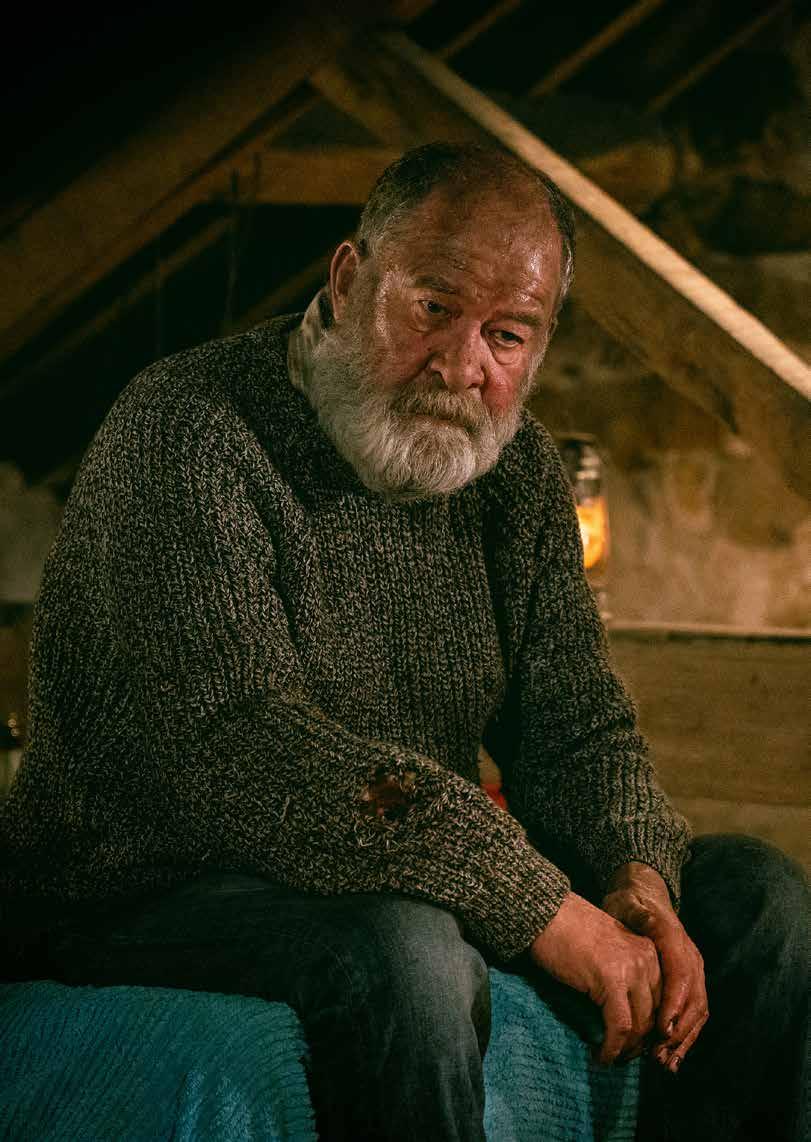
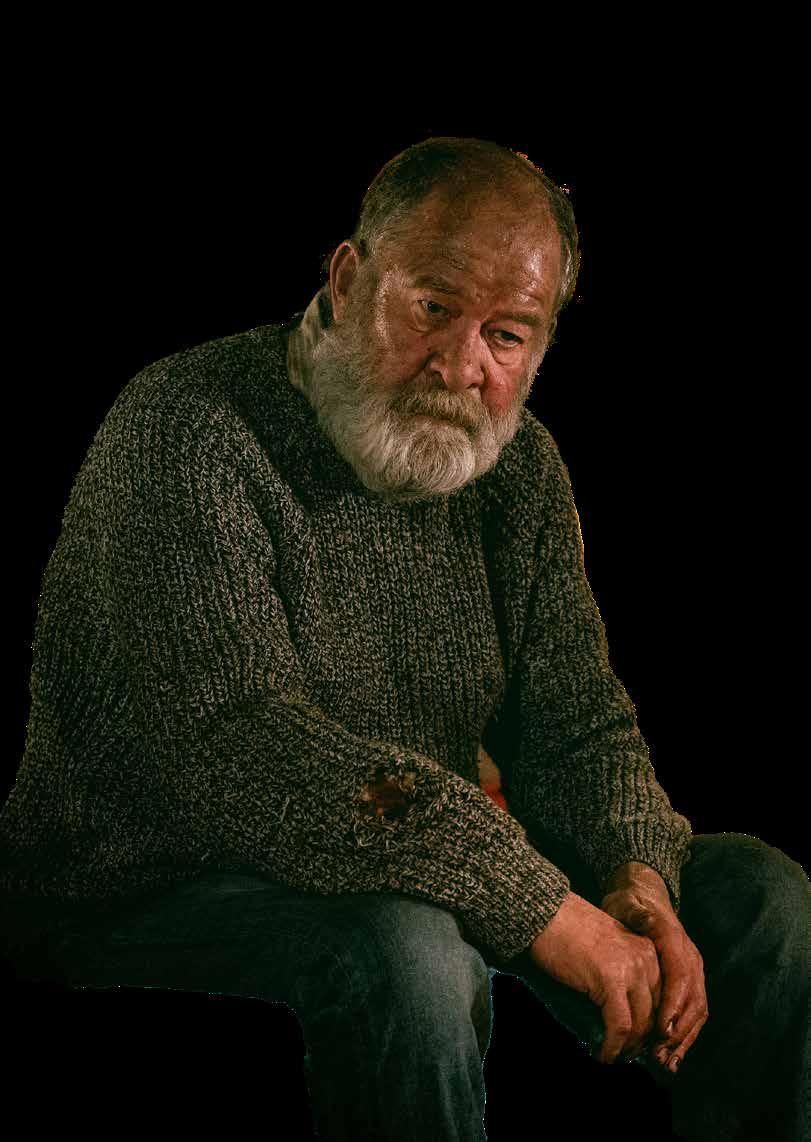

Motor sport ignites learning opportunities

How The Salvation Army helped make Emmerdale’s modern slavery storyline



Motor sport ignites learning opportunities
The Salvation Army is a Christian church and registered charity seeking to share the good news of Jesus and nurture committed followers of him. We also serve people without discrimination, care for creation and seek justice and reconciliation. We offer practical support and services in more than 700 centres throughout the UK. Go to salvationarmy.org.uk/find-a-church to find your nearest centre.
The Salvation Army first published a newspaper called the War Cry in London in December 1879, and we have continued to appear every week since then. Our name refers to our battle for people’s hearts and souls as we promote the positive impact of the Christian faith and The Salvation Army’s fight for greater social justice.
When Bear Wolf disappeared from the Emmerdale community earlier this year, the soap’s viewers could only guess what had happened to him. Few would have suspected that such a strong character would end up a victim of modern slavery.
Now that the story is out, many fans of the show will be shocked. But, in an exclusive interview in this week’s War Cry, Joshua Richards – the actor who plays Bear – tells us how he could see his character reaching a point where he would be vulnerable to abuse.
‘I thought,’ he says, ‘that if Bear would be starting to doubt his capabilities and use to society, maybe he would become the kind of person who could be manipulated and persuaded against his will to do something that he wouldn’t usually entertain.’
When writing the storyline, the soap turned to The Salvation Army for advice. Since 2011, the church and charity has held the government contract to support adult survivors of slavery in England and Wales. Last year alone it worked with more than 2,400 people.
Editor: Andrew Stone, Major
Managing Editor: Philip Halcrow
Staff Writer: Emily Bright
Staff Writer: Claire Brine
Staff Writer: Ewan Hall
Editorial Assistant: Linda McTurk
Graphic Designer: Mark Knight
Graphic Designer: Natalie Adkins
Email: warcry@salvationarmy.org.uk
The Salvation Army
United Kingdom and Ireland Territory
1 Champion Park London SE5 8FJ
Tel: 0845 634 0101
Subscriptions: 01933 445445 (option 1, option 1) or email: subscriptions@satcol.org
Founders: Catherine and William Booth
International leaders: General Lyndon Buckingham and Commissioner Bronwyn Buckingham
Territorial leaders: Commissioners Jenine and Paul Main
Editor-in-Chief: Major Julian Watchorn
0043-0226
The Salvation Army Trust is a registered charity. The charity number in England, Wales and Northern Ireland is 214779, in Scotland SC009359 and in the Republic of Ireland CHY6399. Printed by CKN Print, Northampton, on sustainably sourced paper
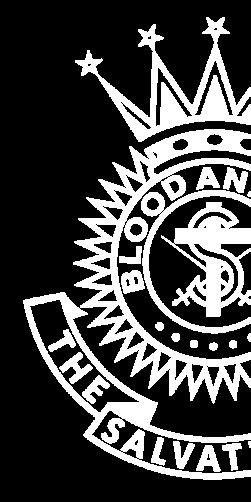

Two thirds of those survivors had endured forced labour. One fifth had been sexually exploited. There were more male survivors (57 per cent) than female. Perhaps, though, the most surprising statistic is that the second largest group accessing support were British nationals, just like the fictional character in Emmerdale
The good news is that The Salvation Army’s work is making a difference in real people’s lives. Ninety-five per cent of those supported go on to live in a place of their own. And the reason why the Christian organisation wants to help people who have been so badly mistreated is that they believe each of them is loved and valued by God.
There isn’t anyone who is not cared for by God. His love extends to each one of us and, if we choose to accept it, we can all experience it in our lives.
When you’ve read the War Cry, why not pass it on ➔ ➔ ➔




feature: Kingdom Sundays BBC1 and iPlayer
By Emily Bright
Leopards, hyenas, wild dogs and lions are all eyeing up territory in Zambia’s Luangwa River Valley. Tracked over five years, the four families are the subject of new nature documentary series Kingdom
In the opening sequence of each episode, narrator David Attenborough muses that the different species are ‘all striving to make this place a home’. He says that in Kingdom viewers ‘will see these rivals compete to stake their claim on this land. Some will rise, others will fall.’
As the series began last weekend, female leopard Olimba was rearing her two cubs. Her son and daughter were on a steep learning curve about what was safe and which animals to avoid. They also began learning how to climb and hunt.
Olimba was patiently stalking prey when she was unexpectedly disturbed by a pack of wild dogs, who were hunting down the same herd. They viewed Olimba as a rival, so, after taking down their prey, they then began chasing her relentlessly. She ran for her life.
The new neighbours were a force to be reckoned with, and bringing up cubs had just become much harder.
When the wild dogs devoured their kill, its smell drifted on the breeze, attracting unwanted attention from a hyena clan who tried to muscle in on the leftovers. A confrontation seemed inevitable. And the hyenas weren’t fussy about who they stole carcasses from – Olimba was their next target.
As if there wasn’t already enough danger, a pride of lions had also moved into the territory – and they wouldn’t shy away from stealing food and attacking rival species.
This weekend, the different families – whose lives become intertwined – will have to keep their young safe from marauding predators and other animals charging through the bush.
What draws all four families into such dangerous proximity is the Luangwa River. ‘It never runs dry,’ explains David. ‘This river sustains an extraordinary variety of life.’
The life-sustaining power of water is something that is recognised in all parts of the world and not just by the
animal kingdom. It’s only natural that humankind’s physical reliance on water has resulted in people through the ages seeing it as a symbol of what is essential in life.
For instance, Jesus once said: ‘Whoever drinks the water that I will give him will never be thirsty. The water that I will give him will become in him a well of life that lasts for ever’ (John 4:14 New Life Version).
He was saying that if people believed
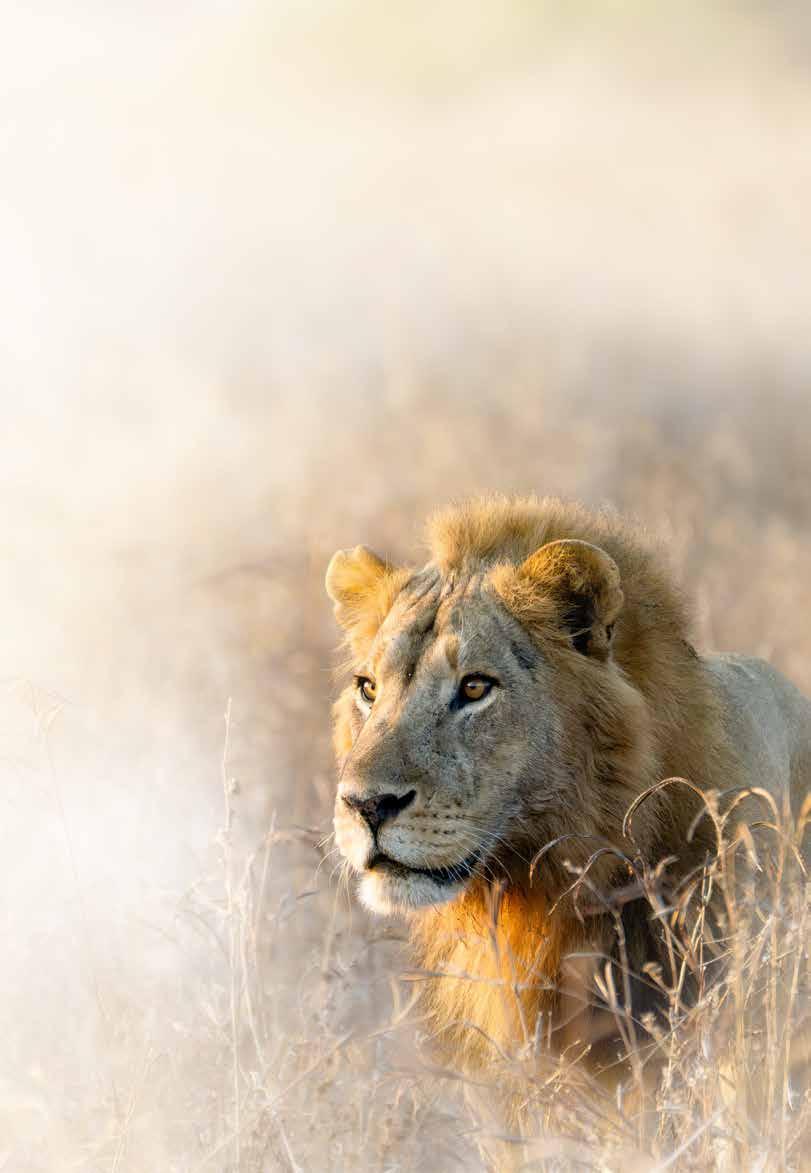
in him and what he said about God, their deepest desires for love, fulfilment and meaning would be met.
God’s love – said Jesus – never runs out. What is more, we don’t have to compete for it: we can all be in a relationship with him that will give us strength to cope with the struggles of life as well as hope for the future.
If we put our trust in God, he will show us not just how to survive, but how to thrive.

Interview by Ewan Hall
Ask a child what they want to be when they grow up, and you may get a variety of glamorous answers, including footballer, actor or astronaut. It was the same for David Horton, whose son, at just nine years of age, declared: ‘Daddy, I want to be a racing driver.’
David was a fan of motor sport but at the time had never even attended a racing event. Nevertheless, despite his inexperience, he decided to support Thomas’s racing dreams.
He then went further. As a teacher, David was already encouraging students to engage with science, technology, engineering and maths. But he saw an opportunity to integrate motor sport into their lessons.
More than a decade down the road, his idea has evolved into something bigger – a fusion of education, motor sport and representation of the Christian
faith at the track.
‘When I was thinking about using motor sport for education, I had this idea of creating a motor sport day,’ says David.
‘We hired out simulators and a pitstop practice set-up – in which kids use pitstop equipment to change a race car tyre – and we’d have the kids do a trackthemed day at school. We also set up other challenges focusing on design and team management work.’
However, after the Covid pandemic, ‘sim racing’ – a genre of video games that aim to realistically simulate the experience of driving a racing car –underwent a change. More people were buying their own simulator rather than renting equipment.
‘At that point, we decided to create a proper experience. We bought our own kits and set up Experience Motorsport,’ says David.

In schools, the experience involves students – and potentially a teacher –engaging with six interactive ‘stations’ that blend motor sport with learning.
The stations include a Scalextric challenge, which introduces circuit concepts such as voltage and resistance; an engine cutaway, which demonstrates internal combustion with moving parts; and a pitstop challenge that builds teamwork and problem-solving. There is also a reaction test in which students hit as many LED targets as possible in 30 seconds – followed by a coding activity in which they reprogram the test to change the order in which the LED targets light up, thereby linking the experience to IT and digital skills.
But the main attraction for the students is the opportunity to get behind the wheel and race each other.
‘The racing simulators – that’s the candy,’ David says. ‘It’s a chance to hop


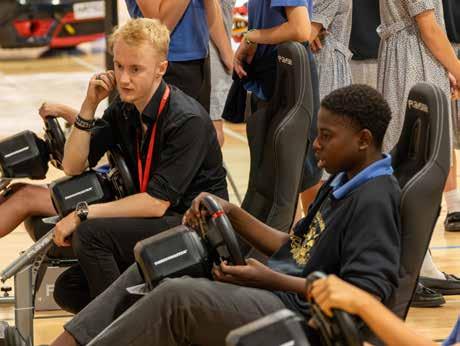
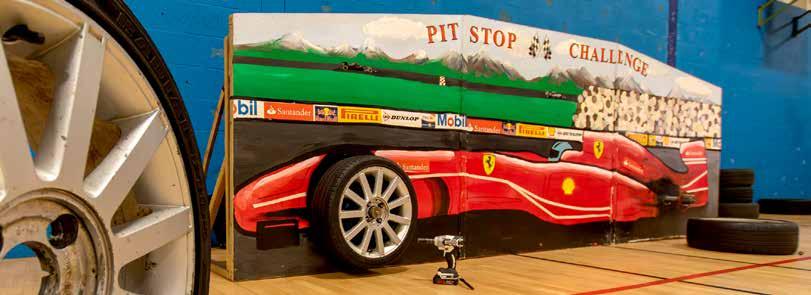
in the seat and drive. That part gets the students excited.’
Schools are not the only destination for Experience Motorsport. Recently, David has been taking the activities to Christian festivals and social events.
‘We show Christians that it is perfectly OK to be passionate about things such as motor racing,’ he says. ‘That openness helps people feel more comfortable with their interests – whether it’s racing or gaming. We are trying to create a space where people feel like they belong.’
Through Experience Motorsport, David has also built a racing team that supports his son in his career as a racing driver and instructor.
‘We initially started in karting and then moved into Ford Fiestas in the junior series before working our way up to the senior championship. But in the last couple of years, we have been racing in Caterhams – lightweight, purpose-built
race cars – where we’ve enjoyed success and taken wins.’
One of the key questions around motor sport is its environmental sustainability. It’s a subject that David is keenly interested in.
Sustainability and motor sport can go hand in hand
‘We’re
very aware of the environmental impact motor sport can have,’ he explains. ‘Which is why we are working with partners to convert our retired Ford Fiesta race car into what we believe will be the world’s first hydrogen combustion race vehicle.
‘While others are building from scratch, we’re proving it’s possible to repurpose existing petrol vehicles – reducing emissions and extending their life. We want to show that sustainability and
motor sport can go hand in hand.’
In David’s eyes, however, his enjoyment of motor sport is not just about racing and educating – it’s also about being an example for Christians in the sector, believing that actions speak louder than words.
‘You don’t go into a space,’ he says, ‘and say, “Hey, I’m a Christian, watch my integrity.” You just live it. People see how you act, and then they react: “Oh, he’s a Christian.”’
His faith shows up in the way he interacts with other teams too. ‘If your competitor breaks a part and you’ve got a spare, you give it to them,’ he says.
And David has found that his approach to racing has had an impact on others.
‘Some young people want us to visit their school because they know we’re Christians,’ he says. ‘There’s a curiosity to see what it looks like to be a Christian in the field of motor sport.’

When ITV’s Emmerdale decided to create a storyline highlighting the horrors of modern slavery, the show’s writers and Joshua Richards, who plays victim Bear Wolf, turned to The Salvation Army’s anti-human trafficking team for help
Feature by Claire Brine
Fans of Emmerdale could see it: something wasn’t right with Bear Wolf. He had become forgetful. A bit down. Prone to outbursts of anger. And then, one day, back in the summer, he disappeared from the village. This week, viewers of the ITV soap have been finding out where Bear went – and why.
‘Before Bear left, he was starting to get a bit confused and depressed,’ says Joshua Richards, the actor who plays him. ‘Viewers wondered if he might be developing Parkinson’s or dementia – but nobody could be sure.
‘The reality was that Bear was suffering from depression because he was feeling somewhat redundant in life, due to getting older. That’s why he had these outbursts of frustration and chose to leave the village.
‘But now that he has returned to the screen, viewers have been able to watch his story unfolding. They saw Bear living out of his car, all alone, having fallen to
the bottom of the pit. And those feelings of worthlessness are what made him just ripe for somebody to offer him a helping hand – and for Bear to be desperate enough to accept it.’
In a special episode broadcast earlier this week, Emmerdale viewers learnt that Bear had become a victim of modern slavery, groomed and then trapped in forced labour by Celia (Jaye Griffiths) and Ray (Joe Absolom), a mother-and-son duo who run a criminal empire.
Each day, after working long hours on a farm that is run by his traffickers, Bear has been forced to spend the night locked in a filthy attic room, along with other exploited individuals. Life is a nightmare – and it appears there’s no way out.
In their efforts to portray the horror of Bear’s story as accurately as possible, producers and writers at Emmerdale turned to The Salvation Army for help. Since 2011, the church and charity has been contracted by the government
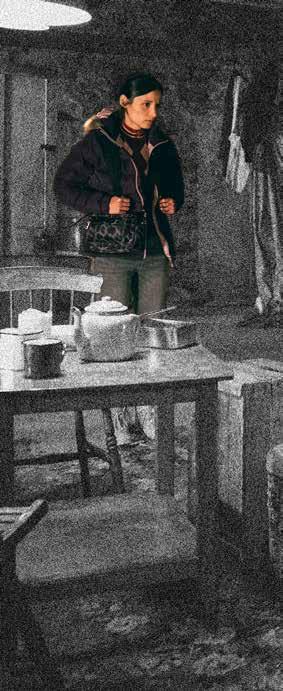
to provide specialist support for adult survivors of modern slavery in England and Wales. Such support includes relocating survivors to a suitable safe house; offering access to legal advice, healthcare, counselling, educational opportunities and financial assistance; and providing help in obtaining employment and housing.
‘A lot of people don’t know what The Salvation Army does to fight against modern slavery,’ Joshua says. ‘But I was aware because it’s an issue close to my heart. One of the biggest problems in the world today is exploitation. And a lot of people use labour.
‘If, for example, you are having an extension built on to your house, one of the biggest bills will be for the labour costs. But people who are unscrupulous recognise that if they can remove that expense, there are vast amounts of money to be made.
‘We’ve seen it happen throughout
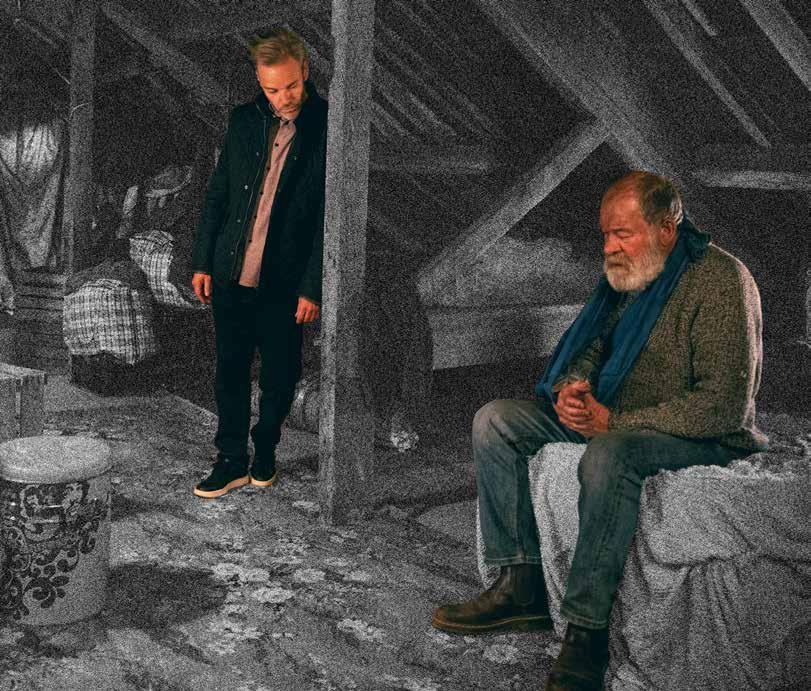
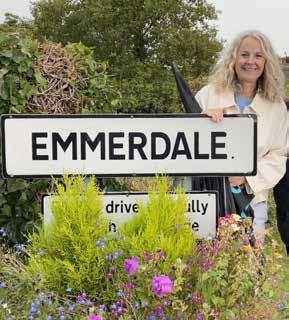
The Salvation Army’s Isobel McFarlane advised the writers of ‘Emmerdale’
history. Whole empires were built on slave labour.’
Earlier this year, when producers came up with the idea for Bear’s trafficking storyline, they approached Joshua to discuss their plans as to how it might work.
‘The first thing that came to my mind was that Bear is quite a strong character, who doesn’t suffer fools quietly – so would this scenario be feasible?’ says Joshua. ‘But then, when we talked about Bear’s
mental health and geriatric depression, it became more believable.
‘I thought that if Bear would be starting to doubt his capabilities and use to society, maybe he would become the kind of person who could be manipulated and persuaded against his will to do something that he wouldn’t usually entertain.’
Society will often turn a blind eye to it
Oncethe script was written, it was sent to staff at The Salvation Army, who had been asked by writers to check it for accuracy and authenticity. After a few minor tweaks, it was time to put the story into action. Set designers created a cramped attic space in which Bear’s
traffickers would force him to live.
‘I’m just an actor, so I would never profess to understand what exploited people are really going through,’ says Joshua. ‘Playing Bear, I’ve been made to look dirty when I’m not really dirty, and I’ve been working in a “horrid” environment that is not really horrid. But for the people who really do have to sleep in terrible places, who are locked in at night, who have only disgusting food to eat, who never see their wages, who have no freedom – all of that must be absolutely soul-destroying.’
As the suffering that Bear has been facing is played out on screen, Joshua hopes that viewers will gain a greater understanding of the global problem of modern slavery. He believes it’s an important subject for Emmerdale to be tackling.
‘Society will often turn a blind eye to it,’
Turn to page 8 f
he says. ‘We all get our cars cleaned, but we don’t always think to ask: “How much is this person being paid for this job?” We’re just glad that it’s cheap.
‘I think it’s bold and brave that Emmerdale is focusing on this story, because all across the world, people are being forced to work for nothing. About 40 million people are in slavery today. We should be horrified by that. I think for ITV to put this subject on the agenda – and to get it into people’s living rooms at 7.30pm on a daily basis – fulfils a great duty.’
As well as depicting the trauma of people trapped in modern slavery, Emmerdale is keen to highlight the fact that organisations such as The Salvation
Army are working round the clock to help victims find freedom.
‘There’s always hope,’ says Joshua, hinting that there could be a light at the end of the tunnel for Bear. ‘Hope springs eternal.’
Isobel McFarlane, whose work in The Salvation Army’s communications office puts her into regular contact with survivors of human trafficking, agrees.
‘It’s important for Emmerdale viewers to see that modern slavery is happening, but it’s wonderful that the show is highlighting the support that exists too,’ she says. ‘With the right help, survivors can recover from trauma and rebuild their lives. There is freedom. There is hope. And that’s the message we want to get across.’
says. ‘She’d remembered that the Army had helped the writers to put that storyline together, so she explained that she was recommending us to the Emmerdale team.
‘She then asked if we would be willing to work with them on a story that the producers had in mind. We replied: “Absolutely!”
‘After signing a number of nondisclosure agreements, a colleague and I were then invited to an online meeting with the Emmerdale team. They had a strong idea of what they wanted Bear’s story to be, but they wanted a few extra insights, so they asked us questions such as: “How might a criminal groom somebody? How would they threaten and control their victim?”
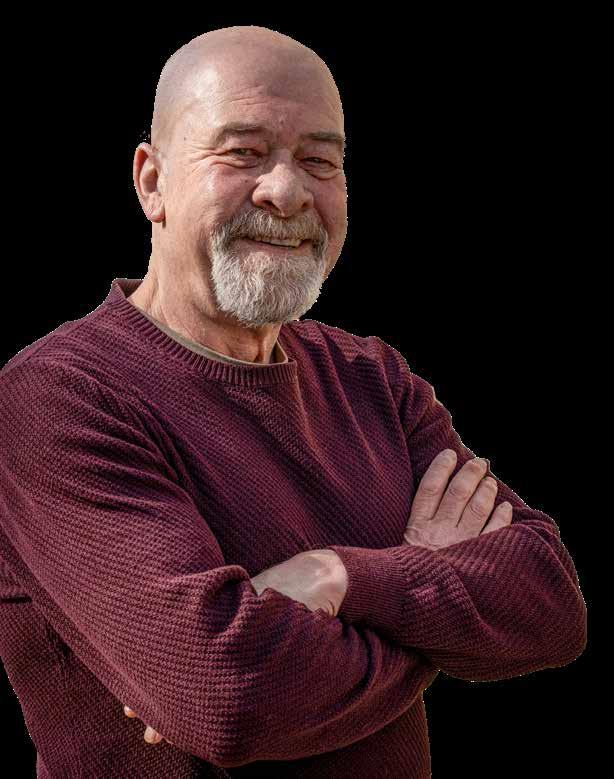
The writers would ask: ‘Is it realistic?’
hey also wanted specific details about the living conditions for exploited people, and the reasons why they might not be able to escape. I was able to share stories that survivors have told me, explaining that slavery isn’t always about being controlled physically –it can be psychologically as well.’
Every answer Isobel gave to the creative team prompted another round of questions. Then, the writers went away to start work on the scripts.
‘They would ask me to read them and highlight anything that didn’t feel right,’ says Isobel. ‘Although there has to be a bit of room for dramatic licence, everyone was keen for the scenes to be as authentic as possible.
‘Sometimes the writers would ask me more direct questions like: “We want this character to do such-and-such – how might that happen? Is it realistic for this character to behave in that way?”
‘I’d look at the script and share it with a few people from The Salvation Army’s anti-trafficking team, including first responders, who are responsible for interviewing victims in order to find out the facts about what has happened to them. All of them had a read-through and had the opportunity to come back with comments.’
Most of the feedback offered by Isobel and her team indicated that only minor tweaks to the script were necessary. But she reflects that when she worked
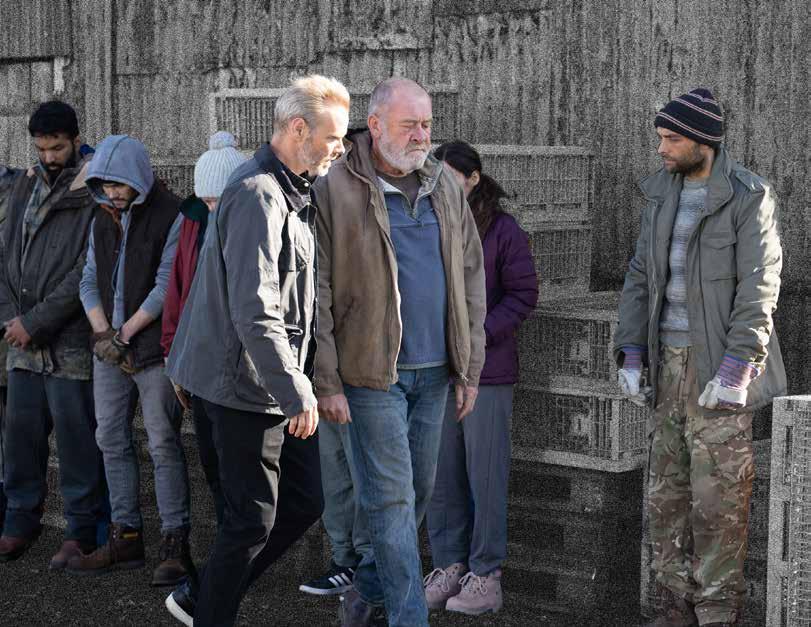
with writers at Coronation Street back in 2019, her suggestions for their modern slavery storyline changed the direction of the plot entirely.
‘Initially, Coronation Street writers had planned to do a big police raid of the place where a victim was trapped in slavery,’ she says. ‘And this victim was going to be shot and killed, as collateral. But we said: “Don’t do that! There could be a massive message of hope here. There is support for survivors of modern slavery to rebuild their lives. If you shoot the victim, you’re missing that opportunity.”
‘And Coronation Street listened to us. The victim character survived, got support, went back to Romania and even came back to the cobbles a few years later.’
With Emmerdale, Isobel was able to see first-hand the ways in which the soap had taken on board her insights when she made a visit to the set. Joshua took her on a tour of Bear’s attic, showing her the
dirty bedclothes on the floor, a metal basin used by the victims for washing, and a bucket in the place of a toilet, positioned behind a piece of cloth for privacy.
‘Viewers can see: this is all they’ve got,’ says Isobel. ‘They can see these victims being coerced and controlled –physically and psychologically – by clever, manipulative criminals.
‘It’s good that this story is being put on screen, because it shows that modern slavery is hidden in plain sight. Bear is trapped in a farm that’s very close to his own home.
‘A lot of people don’t believe that these kinds of situations are happening. Or they don’t think that slavery affects British nationals. But it does happen – and we hope that Bear’s devastating story will prompt viewers to report in the future anything they see that looks suspicious. We also hope that victims will feel that it’s worth coming forward, because they will receive our support.’
Individuals such as Jakub, from
Slovakia, are testament to the help that The Salvation Army extends to people who are being exploited. A victim of modern slavery, he lived with a family in the UK who confiscated his identity documents and took away the wages he received from his job in a factory. After assaulting him, they kicked him out, leaving him penniless and homeless.
When Isobel arranged for Jakub to talk with Joshua, in the weeks before Bear’s storyline was broadcast, he shared his personal story with the actor, and expressed gratitude for the way in which The Salvation Army had helped him to find freedom and rebuild his life. It was a conversation that Joshua promised never to forget.
‘My message is: don’t give up,’ Jakub told Joshua. ‘If people need help, support is out there. The Salvation Army offered me amazing help. I’m not giving up and I will never give up.’
l Jakub’s name has been changed
Feature by Claire Brine
Before he portrayed Bear Wolf’s forced labour storyline on ITV’s Emmerdale, the actor Joshua Richards was grateful to share a conversation with Jakub, a survivor of modern slavery. I was invited to join their video call, in which Jakub – who is of a similar age to Joshua – told his story of why he moved from Slovakia to the UK, how he came to be abused by traffickers and what happened when he sought help from The Salvation Army.
Speaking through an interpreter, Jakub explained how he came into contact with the couple who would go on to control and abuse him.
It was around 2018 when he met them
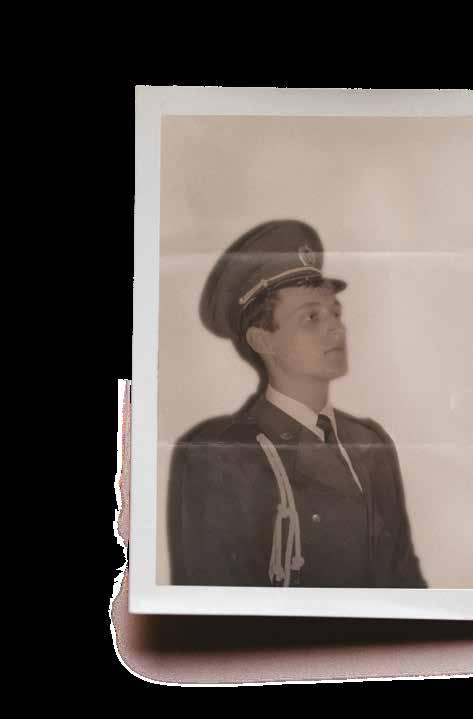
in Slovakia. He was struggling financially at the time, so they tried to persuade him to move to the UK, where they lived. They also promised that they would help him with accommodation and finding work. Jakub was grateful to accept their support.
When Jakub arrived in England, the couple gave him a small room in their house to live in. They also arranged for him to start work, through an agency, at a meat production facility.
Though Jakub’s employer was a legitimate company, Jakub did not have a bank account – so his traffickers arranged for his wages to be paid into their own account.

‘When we came to the UK, all was nice at first,’ says Jakub. ‘But then, slowly, the couple’s other family members started coming to stay in the house. I was the only one – out of all of them – who was working.’
The traffickers used the money that Jakub earned to pay the rent and food bills. They also took Jakub’s official identity documents, enabling them to open a bank account in his name, which only they could access. When Jakub found out about the account and asked to receive his earnings, the trafficker’s son assaulted him. The resulting injury required 24 stitches.
‘I wasn’t appreciated or valued,’ says


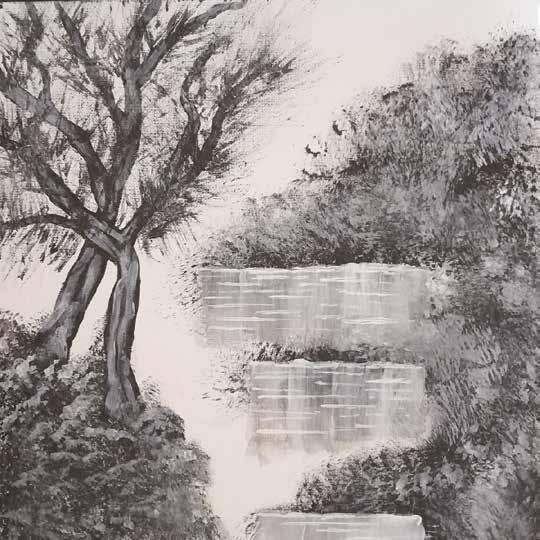
Jakub is now pursuing his passion for painting
Jakub. ‘I wanted to distance myself from the family. They had a physical temper. But it was hard to prove what was happening to me, because it was just one witness against another witness. And there were more of them.’
As well as subjecting Jakub to further assaults, the traffickers accrued debts in his name by purchasing items such as smartphones and household appliances on credit. Jakub had no idea that this was happening.
When he was at home, he was used to confining himself to his room. He wanted to leave, but his traffickers pressured him to stay, saying that he would suffer if he walked out. They also kept hold of his identity documents, leaving him feeling powerless.
Then, one day, Jakub’s traffickers kicked him out of the house.
‘They never let me back in,’ he explains. ‘So I had only my jeans that I was wearing, a shirt and a jumper. I thought: “This is the life of a homeless person.”’
Jakub decided to report his situation to his boss, who, in turn, contacted the police and the Gangmasters and Labour
Abuse Authority. The traffickers fled the country, taking Jakub’s documents with them.
‘That’s when the depression started kicking in,’ says Jakub. ‘Emotions started bursting out of me. They were exploding.’
It was at this point that Jakub was referred to The Salvation Army’s modern slavery team for support. After all the trauma he had suffered, he finally felt that life was beginning to turn a corner.
When I think of the future, it’s very nice
‘M y employer and The Salvation Army helped me a lot,’ he says. ‘I’m so thankful to them both. The Army offered amazing help and found me some accommodation.’
The church and charity allocated Jakub a support worker, called Jake, who worked alongside other support staff to establish Jakub’s needs and take the necessary steps to meet them.
When debt collection agencies kept
contacting Jakub about his fraudulent debt, it was a support worker who reported the matter to Action Fraud, prompting the agencies to drop his case. Other support staff were on hand to help Jakub access universal credit, as physical health issues and poor mobility meant that he was no longer able to work.
Today, Jakub enjoys pursuing his artistic passions of painting and photography, and has also begun to take online English classes using a laptop provided by The Salvation Army’s Survivor Support Fund.
‘I’ve never given up,’ says Jakub. ‘I will always try to do things. I paint nature and architecture and have seen three of my paintings being used in an exhibition in London. I want to do more exhibitions.
‘When I think about the future, it’s very nice. I just want to keep doing all the things I do now. I want to paint and perhaps do some work with The Salvation Army. I have lots of plans. Every day is a new day.’
l Jakub’s name has been changed
Your prayers are requested for L’s dad, who is having surgery.
The War Cry invites readers to send in requests for prayer, including the first names of individuals and details of their circumstances, for publication. Send your Prayerlink requests to warcry@salvationarmy.org.uk or to War Cry, 1 Champion Park, London SE5 8FJ. Mark your correspondence ‘Confidential’.
Becoming a Christian
There is no set formula to becoming a Christian, but many people have found saying this prayer to be a helpful first step to a relationship with God
The word ‘gospel’ comes from the Old English ‘godspel’ and means ‘good news’. Like four reporters covering the same story, the Gospel writers Matthew, Mark, Luke and John record key events and quotes from the life of Jesus from different angles and for differing audiences.
Matthew, Mark and Luke focus on what Jesus said, did and experienced. John delves into who Jesus was. All four heavily feature the events immediately leading up to Jesus’ death and resurrection.
The Gospels are not a product of divine dictation or angelic revelation. They are not myths, philosophies or allegories, but are firmly set in human history – real time, real places, real people and real events. Just as journalists have their sources, so the Gospels are based on information from witnesses.
Dating from between AD65 and AD70, Mark is the earliest and shortest of the Gospels. Scholars detect Mark’s associate and Jesus’ lead disciple Peter as a key source.
Lord Jesus Christ,
I know that I have done things in my life that are wrong and I’m sorry.
Thank you that I can ask you for forgiveness because of the sacrifice you made when you died on the cross.

Please forgive me and help me to live a better life in the future as I learn how to love you and follow your way of living.
Thank you, Lord Jesus.

With many of Mark’s stories appearing in Matthew and Luke, scholars have battled to discover Matthew and Luke’s sources. One theory is that they used Mark plus an undiscovered source that scholars label Q (from quelle, the German for ‘source’) plus their own material. Because these Gospels cover much of the same ground, they are known as the Synoptic (literally, ‘together seeing’) Gospels. John was written independently.
By the early 2nd century, the early Church had accepted the four Gospels as inspired, authentic and authoritative. Occasionally, excited references to ‘lost gospels’ appear in the media – as well as in The Da Vinci Code. Quoting the ‘Gospel of Philip’ and the ‘Gospel of Mary’, novelist Dan Brown popularised the idea that the Church historically suppressed the whole truth about Jesus. Products of the 3rd century, many of these ‘gospels’ are the works of Gnosticism, a philosophy that linked salvation with secret knowledge.
By contrast, first-century convert Paul outlines the truths that we need to believe in order to be saved: ‘By this gospel you are saved, if you hold firmly to the word I preached to you … that Christ died for our sins according to the Scriptures, that he was buried, that he was raised on the third day … and that he appeared’ (1 Corinthians 15:2–8 New International Version). These are events that are recorded by all four Gospel writers.

If you’ve prayed this prayer, scan the QR code or contact us using the coupon on this page






















"


































To receive basic reading about Christianity and information about The Salvation Army, complete this coupon and send it to





War Cry 1 Champion Park London SE5 8FJ a

Or email your name and postal address to warcry@salvationarmy.org.uk





















James Corden and Ruth Jones wrote and starred in which longrunning sitcom?
The Rosetta Stone was discovered by French soldiers in Egypt in which century?
3 4 5 6
Simba, Mufasa and Nala are characters in which 1994 animated film?
Which British scientist invented the world wide web?
What does the Spanish greeting ‘buenos dias’ mean?
Who is the author of the illustrated book Always Remember?
Feature by Ewan Hall
Are the kids alright? That’s the question being asked by the UN for World Children’s Day on Thursday (20 November), challenging us to make sure that children are heard, their rights protected and their future made brighter.
The day highlights the significance of the UN’s adoption of the 1959 Declaration of the Rights of the Child and the 1989 Convention on the Rights of the Child, which together have established children’s rights as human rights and shaped laws and policies around the world.
To mark the day, the UN’s children’s agency Unicef and its partners are putting children in the spotlight. Young people will temporarily take on roles in media, politics and business, giving them a platform to share the changes they want to see in the world.
In a show of unity, landmarks such as the Eiffel Tower in France and Chichen Itza in Mexico will be lit up in blue.
Despite all the efforts that campaigners have made in the past, not all children live in peace and prosperity. In 2023, Unicef reported that 20.8 million children were displaced within their own countries. Approximately 1 billion children live in areas at high risk of climate and environmental hazards.
Behind these numbers are real individuals – children who are scared, uncertain and longing for someone to care. And, while their circumstances may be very different from our own, the feelings they experience could be familiar.
Many of us can remember moments from our own childhood when we felt alone, afraid and unsure. Even when we are adults, those emotions can still surface. Life has challenges at every stage, and we all need someone to lean on.
Across the generations, many people have found that God provides them with unwavering support.
In the Bible, one writer acknowledges to God: ‘Even though I walk through the darkest valley, I will fear no evil, for you are with me’ (Psalm 23:4 New International Version
We may not be walking through literal valleys, but life can bring its own dark times. Through them all, however, God offers to be with us –comforting, guiding and making sure we are alright.

1. Scatter (5)
5. Object (5)
8. Likeness (5)
9. Clear (5)
10. Lawful (5)
11. Barter (5)
12. Memo (4)
15. Allow (6)
17. Shield (5)
18. Trusted adviser (6)
20. Liquid food (4)
25. Refuge (5)
26. Passage (5)
Hold back (5)
Emerge (5) 29. Sedate (5) 30. Oarsman (5)
1. Grave (6)
2. Not long past (6)
3. Breadth (5)
4. Tediously unoriginal (5)
5. Erased (7)
6. Large bottle (6)
7. Yield (6)
13. Lyric poem (3)

14. Animal hair (3)
15. Snoop (3)

Elude (5
Each solution starts on the coloured cell and reads clockwise round the number


Relating

Look up, down, forwards, backwards and diagonally on the grid to find these words associated with faithfulness



1 cooking apple, plus 1 for topping (optional)
50g butter
50g sugar
2tbsp golden syrup, plus 1tbsp for topping (optional)
1tsp cinnamon
200g porridge oats




Preheat the oven to 200C/Gas Mark 6. Line a baking tray with enough greaseproof paper so that you can lift the flapjacks from the tray easily after baking.
Peel and grate an apple and set aside.
Melt the butter and sugar in a pan, then add 2tbsp golden syrup and the cinnamon. Take the pan off the heat, then add the porridge oats and the grated apple to the mixture.
Pour the mixture into the tray, spreading it to the edges, then flatten to level. Bake in the oven for 20-30 minutes, checking occasionally.
Remove from the oven and slice into as many pieces as desired, then allow to cool completely.
For the optional topping, when the flapjacks have cooled, place 1 slice of apple on each.
Pour the extra golden syrup into a pan on a medium heat and stir to heat through. Pour it over the sliced apples on the flapjacks, then serve.

2tbsp olive oil
1 onion, chopped
2 carrots, sliced
4 boneless skinless chicken thighs, cut into 1cm pieces
1 head broccoli, chopped
1 cauliflower, chopped
3tbsp tomato puree
3tbsp curry powder
½ tsp garlic granules
100ml chicken stock
Salt and pepper
Rice or jacket potatoes, to serve
Heat the oil in the pan and cook the onion and carrots for 15 minutes with the lid on, stirring occasionally, until they are softened and lightly coloured.
Add the chicken and cook for 15 minutes, until slightly browned, stirring regularly to make sure nothing sticks to the pan. Mix in the broccoli and cauliflower and cook for 5 minutes, until the vegetables are golden.
Stir in the tomato puree, curry powder, garlic granules and chicken stock until combined. Let the curry simmer for 10 minutes, until it is slightly thickened and the vegetables are tender.
Remove from the heat and season with salt and pepper, if desired.
Serve with rice or jacket potatoes.

WHEN WE COME
Max Feener